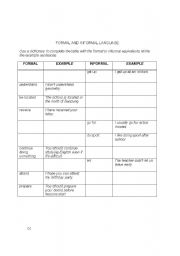
|
Formal and informal language
This is a worksheet designed to help students to develop knowledge of formal and informal equivalents for a number of useful expressions. This is useful in a general sense, but it is especially useful for preparing students for the writing section of exams like IGCSE Second Language English.
N.B. The expressions here were based in part on expressions with which I have found my Indonesian students tend to make mistakes. For example, they are not aware that the structure "be located" should only be used in formal writing.
Students should use dictionaries to help them, and they should be encouraged to check that what they write is in the correct register by using a dictionary.
To make this worksheet more fun, I suggest doing it as a race in teams of 4, with the worksheet printed on A3 paper. Stick the A3 worksheets on the wall or whiteboard. Students take it in turns to run, read one of the expressions on the worksheet, run back, tell it to the group. The group then discusses and finds the formal/informal equivalent, and the next student runs back, writes the answer down and reads another one. The winner is the first group to get all correct, or the group with the most correct answers after a time limit has expired.
After the game, give each student their own copy of the worksheet. From memory, they copy down the correct answers (this stage helps students to memorise the expressions).
Enjoy!
Level:intermediate
Age: 12-17
Downloads:5 |
|
Copyright 28/3/2010 Rich Egerton
Publication or redistribution of any part of this
document is forbidden without authorization of the
copyright owner.
|


see more worksheets by richegerton
|